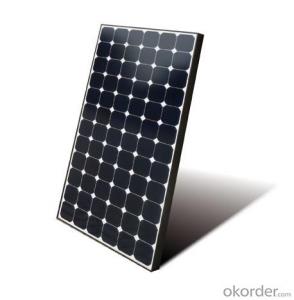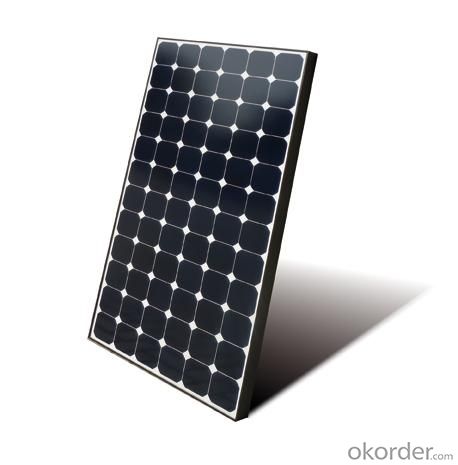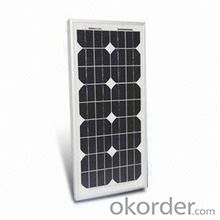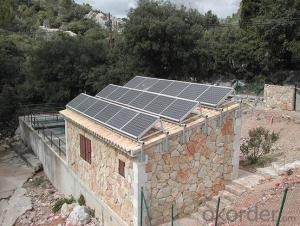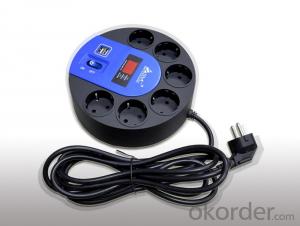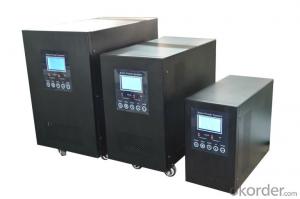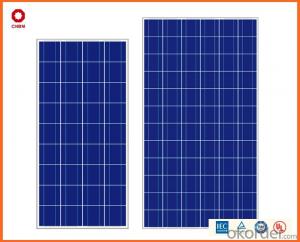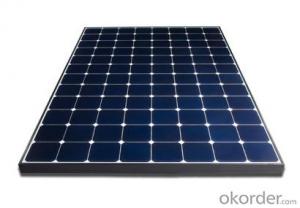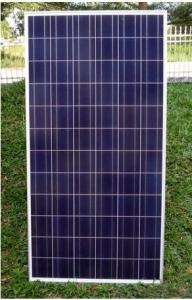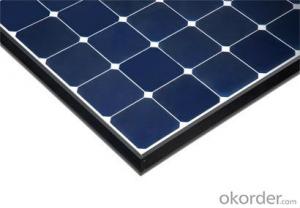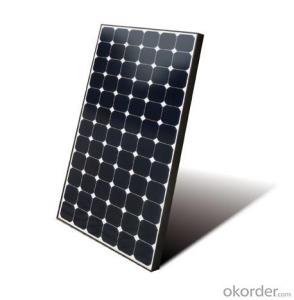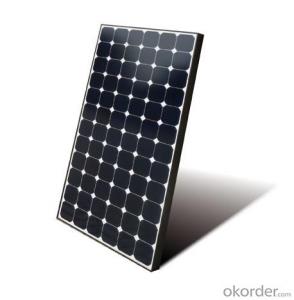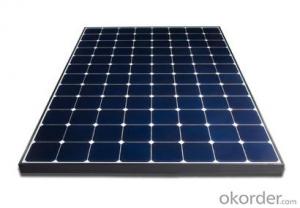Mirasol Solar Energy Systems - CNBM On-Grid System 20KW with UL, TUV, CE Certificate
- Loading Port:
- Shanghai
- Payment Terms:
- TT OR LC
- Min Order Qty:
- 100 watt
- Supply Capability:
- 1000 watt/month
OKorder Service Pledge
OKorder Financial Service
You Might Also Like
Specification
CNBM On Grid System 30KW with Certificate UL TUV CE
Product description
They range from small residential and commercial rooftop systems to large utility-scale solar power stations. Unlike stand-alone power systems, a grid-connected system rarely includes an integrated battery solution, as they are still very expensive. When conditions are right, the grid-connected PV system supplies the excess power, beyond consumption by the connected load, to the utility grid.
Connection of the photovoltaic power system can be done only through an interconnection agreement between the consumer and the utility company. The agreement details the various safety standards to be followed during the connection.[4]
Solar modules use light energy (photons) from the sun to generate electricity through the photovoltaic effect. The majority of modules use wafer-based crystalline silicon cells or thin-film cells based on cadmium telluride or silicon. The structural (load carrying) member of a module can either be the top layer or the back layer. Cells must also be protected from mechanical damage and moisture. Most solar modules are rigid, but semi-flexible ones are available, based on thin-film cells.Bypass diodes may be incorporated or used externally, in case of partial module shading, to maximize the output of module sections still illuminated.
Systems such as Net Metering and Feed-in Tariff which are offered by some system operators, can offset a customers electricity usage costs. In some locations though, grid technologies cannot cope with distributed generation feeding into the grid, so the export of surplus electricity is not possible and that surplus is earthed.
Grid-connected PV systems are comparatively easier to install as they do not require a battery system.[1][6]
Grid interconnection of photovoltaic (PV) power generation systems has the advantage of effective utilization of generated power because there are no storage losses involved.[7]
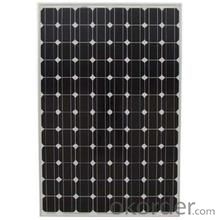
Application
Industrial
Commercial
Residential
Feature
Residential, grid-connected rooftop systems which have a capacity more than 10 kilowatts can meet the load of most consumers.[2] They can feed excess power to the grid where it is consumed by other users. The feedback is done through a meter to monitor power transferred. Photovoltaic wattage may be less than average consumption, in which case the consumer will continue to purchase grid energy, but a lesser amount than previously. If photovoltaic wattage substantially exceeds average consumption, the energy produced by the panels will be much in excess of the demand. In this case, the excess power can yield revenue by selling it to the grid. Depending on their agreement with their local grid energy company, the consumer only needs to pay the cost of electricity consumed less the value of electricity generated. This will be a negative number if more electricity is generated than consumed.[3] Additionally, in some cases, cash incentives are paid from the grid operator to the consumer.
Packaging
With carton and box
- Q: Can solar energy systems be used in areas with limited access to solar energy consultants?
- Yes, solar energy systems can still be used in areas with limited access to solar energy consultants. While it may be challenging to have professional assistance, there are resources available online, guides, and tutorials that can help individuals and communities in these areas understand and set up solar energy systems. Additionally, some companies offer remote consultations and support services, making it possible to overcome the limitations of physical access to solar energy consultants.
- Q: How do solar energy systems impact energy storage technologies?
- Solar energy systems have a significant impact on energy storage technologies by providing a clean and renewable source of electricity. These systems generate electricity during the day when the sun is shining, but often produce more energy than needed. Energy storage technologies allow excess energy to be stored and used during periods of low or no solar generation, ensuring a constant and reliable power supply. This integration of solar energy systems with energy storage technologies promotes grid stability, reduces reliance on fossil fuels, and accelerates the transition towards a sustainable energy future.
- Q: How do solar energy systems affect the aesthetics of a building?
- Solar energy systems can have both positive and negative effects on the aesthetics of a building. On one hand, solar panels can be visually appealing and add a modern, eco-friendly touch to the structure. They can be seamlessly integrated into the design, enhancing the overall look of the building. On the other hand, if not properly installed or maintained, solar panels can appear bulky and disrupt the visual harmony of the building. The placement and orientation of the panels should be carefully considered to minimize any negative impact on the building's aesthetics.
- Q: Are there any health benefits associated with using solar energy?
- Yes, there are numerous health benefits associated with using solar energy. Solar power is a clean and renewable source of energy that reduces reliance on fossil fuels, thus reducing air pollution and greenhouse gas emissions. This improves air quality and lowers the risk of respiratory and cardiovascular diseases. Additionally, solar energy systems do not produce harmful emissions or noise pollution, contributing to a healthier and quieter environment.
- Q: Can solar energy be used for hot water?
- Yes, solar energy can be used to heat water through the use of solar thermal systems or solar water heaters. These systems collect the sun's energy and transfer it to the water, providing a sustainable and cost-effective solution for hot water production.
- Q: Can a solar energy system be installed in an area prone to hurricanes?
- Indeed, it is feasible to install a solar energy system in an area susceptible to hurricanes. Nevertheless, certain measures and considerations must be taken into account to guarantee the system's resilience and safety during extreme weather occurrences. First and foremost, it is advisable to utilize hurricane-resistant solar panels specifically engineered to endure powerful winds and airborne debris. These panels typically comprise reinforced glass and possess a higher wind load rating. Additionally, the mounting system employed should also be hurricane-resistant, featuring robust foundations and secure fastenings. Furthermore, the installation process should involve a comprehensive inspection of the area to identify any potential risks or hazards. Factors such as the elevation of the installation site, proximity to bodies of water, and adherence to local building codes should be taken into consideration to ensure the system is installed in a secure and safe manner. In hurricane-prone regions, it is also crucial to have a backup power system in place. This can be achieved through battery storage or a backup generator, which can supply electricity during power outages caused by severe weather. Regular maintenance and inspections play a vital role in the durability and safety of a solar energy system in hurricane-prone areas. This includes assessing the panels' integrity, wiring, and mounting structure, as well as trimming trees and foliage that could potentially harm the system during high winds. All in all, while it is possible to install a solar energy system in an area prone to hurricanes, it is imperative to adhere to specific guidelines and precautions to ensure the system's ability to withstand severe weather conditions and continue operating safely and efficiently.
- Q: Can solar energy systems be used for water heating?
- Yes, solar energy systems can definitely be used for water heating. Solar water heaters use the sun's energy to heat water for various domestic and industrial purposes. They are cost-effective, environmentally friendly, and can significantly reduce energy consumption and utility bills.
- Q: How much space is needed for installing a solar energy system?
- The amount of space needed for installing a solar energy system varies depending on various factors such as the size of the system, the type of solar panels used, and the energy requirements of the property. Generally, for residential installations, a typical rooftop solar system requires around 100 to 400 square feet of space. However, it is recommended to consult with a professional installer who can assess the specific requirements of your property and provide accurate information on the space needed for a solar energy system.
- Q: Can solar energy systems be installed without professional help?
- No, it is not recommended to install solar energy systems without professional help. Proper installation requires expertise and knowledge of electrical and structural considerations to ensure the system's safety, efficiency, and compliance with local regulations. Hiring a professional ensures that the installation is done correctly and maximizes the benefits of solar energy.
- Q: Can solar energy systems be used in areas with high levels of vandalism or theft?
- Solar energy systems can certainly be used in areas with high levels of vandalism or theft. However, precautionary measures such as installing security cameras, using tamper-proof mounting systems, and implementing proper fencing can help deter potential thieves or vandals. Additionally, community engagement and education about the benefits of solar energy may also help in reducing such incidents.
Send your message to us
Mirasol Solar Energy Systems - CNBM On-Grid System 20KW with UL, TUV, CE Certificate
- Loading Port:
- Shanghai
- Payment Terms:
- TT OR LC
- Min Order Qty:
- 100 watt
- Supply Capability:
- 1000 watt/month
OKorder Service Pledge
OKorder Financial Service
Similar products
Hot products
Hot Searches
Related keywords
